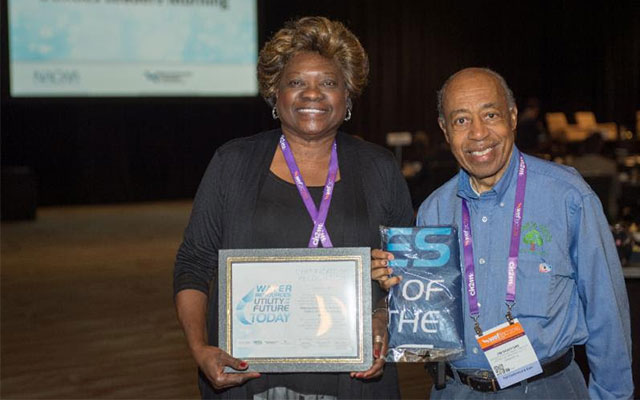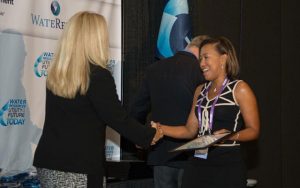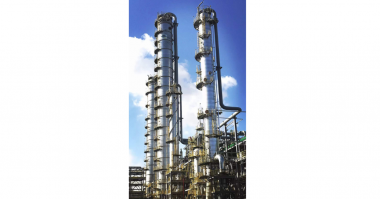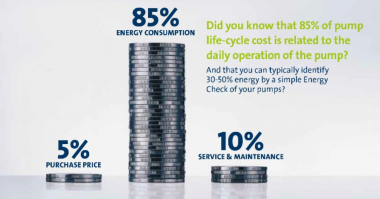61 water sector organizations show success in innovative and sustainable utility management practices
The Metropolitan Water Reclamation District of Greater Chicago and 60 other utilities from across the U.S., Canada, and Denmark were recently selected by a peer committee of utility leaders to receive the inaugural “Utility of the Future” (UOTF) designation. Vice President Barbara McGowan and Commissioners Frank Avila, Timothy Bradford, and Kari Steele were among the recipients who were honored during a September 27 ceremony held in conjunction with the Water Environment Federation’s (WEF’s) 89th annual technical exhibition and conference in New Orleans, LA. The recipients received a display flag and a special certificate to further identify and promote their outstanding achievement as a Utility of the Future organization.
“This is a tremendous honor,” said MWRD Vice President Barbara McGowan. “It is satisfying to know that the work of the District sets an example for hundreds of organizations across the country.”
The selection committee determined that the MWRD meets the criteria by taking into consideration organizational culture, beneficial biosolids use, community partnering and engagement, energy efficiency, energy generation and recovery, nutrient and materials recovery, water reuse and watershed stewardship.
The UOTF Recognition Program is a partnership of water sector organizations-the National Association of Clean Water Agencies (NACWA), WEF, the Water Environment & Reuse Foundation (WE&RF) and the WateReuse Association with input from the U.S. Environmental Protection Agency (EPA). The program celebrates the progress and exceptional performance of wastewater utilities while supporting the widespread adoption of the innovative UOTF business model.
The UOTF concept was introduced in 2013 to guide utilities of all sizes toward smarter, more efficient operations and a progression to full resource recovery with enhanced productivity, sustainability, and resiliency. The nominating committee selected utilities for recognition based on the adoption of UOTF principles: water reuse, watershed stewardship, beneficial biosolids reuse, community partnering & engagement, energy efficiency, energy generation & recovery, and nutrient & materials recovery.
“As we embrace this concept of becoming a utility of the future, the District is actively forming new partnerships, reducing energy usage, investing in green infrastructure, and recovering and reusing valuable resources,” said Commissioner Kari Steele. “We thank the selection committee for this recognition and will continue to strive for innovation and improvements in water quality that make us a utility of the future today.”
The MWRD has worked to improve the environment and protect public health for 127 years; however, its work has evolved. Sewage is no longer a waste product but is instead a collection of resources to be recovered and reused; similarly, it has become a proactive agency that prides itself on many partnerships and collaborative efforts to improve the quality of life throughout Cook County.
“While the MWRD designs and operates treatment processes with an eye towards energy efficiency, the agency aspires to become energy neutral by 2023,” said MWRD President Mariyana Spyropoulos. “This achievement will provide a return on investment that will benefit taxpayers and the environment. Through resource recovery efforts, the MWRD is also providing a similar return to taxpayers and the environment.”
The MWRD partnered with others to successfully amend legislation to qualify exceptional quality biosolids as a sustainable fertilizer for public use. The MWRD is producing safe, beneficial, and renewable composted biosolids to be distributed to community gardens and other landscaping with a goal of 50,000 cubic yards for sale by 2017. Other highlights include the unveiling of the world’s largest nutrient recovery facility that recovers phosphorus and nitrogen to create a high value fertilizer, marketed as Crystal Green. In addition, the MWRD is pursuing the sustainability of growing algae in a “vertical revolving” fashion; this would reduce the footprint to grow an equivalent algae biomass in a surface pond and simplify the harvesting process. The algae could remove at least 50 percent of phosphorus from wastewater and can be commoditized for production of bioplastics, biochemicals, biofuels, or aquaculture feed.
“NACWA applauds all the recipients of the inaugural Utility of the Future Recognition Program,” said NACWA CEO Adam Krantz. “Utility leaders are engaged in unparalleled innovation and this recognition will inspire the sector as a whole to achieve still untapped economic and environmental benefits for their communities and the nation.”
To learn more about the Utility of the Future (UOTF) Today Recognition Program, visit www.wefnet.org/utilityrecognitionor contact UtilityRecognition@wef.org. A list of the 61 water sector organizations can be found at this link: http://www.wef.org/uotf-today-2016-recipients/.
About the Metropolitan Water Reclamation District of Greater Chicago
Established in 1889, the MWRD (www.mwrd.org) is an award-winning, special purpose government agency responsible for wastewater treatment and stormwater management in Cook County, Illinois. display the new certificate and flag at the Utility of the Future Recognition ceremony.






Comments